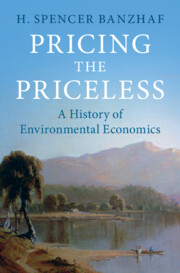Book contents
- Pricing the Priceless
- Historical Perspectives on Modern Economics
- Pricing the Priceless
- Copyright page
- Dedication
- Contents
- Figures
- Acknowledgments
- Acronyms
- Prologue
- 1 Introduction
- 2 Conservation and Preservation
- 3 Do Economists Know about Lupines? Economics versus the Environment
- 4 Consumer Surplus with Apology
- 5 John Krutilla and the Environmental Turn in Natural Resource Economics
- 6 Pricing Pollution
- 7 Lives, Damned Lives, and Statistics
- 8 Benefit–Cost Analysis: Objective or Multi-objective?
- 9 Constructing Markets
- Epilogue
- References
- Index
- Other Books in the Series
6 - Pricing Pollution
Published online by Cambridge University Press: 19 October 2023
- Pricing the Priceless
- Historical Perspectives on Modern Economics
- Pricing the Priceless
- Copyright page
- Dedication
- Contents
- Figures
- Acknowledgments
- Acronyms
- Prologue
- 1 Introduction
- 2 Conservation and Preservation
- 3 Do Economists Know about Lupines? Economics versus the Environment
- 4 Consumer Surplus with Apology
- 5 John Krutilla and the Environmental Turn in Natural Resource Economics
- 6 Pricing Pollution
- 7 Lives, Damned Lives, and Statistics
- 8 Benefit–Cost Analysis: Objective or Multi-objective?
- 9 Constructing Markets
- Epilogue
- References
- Index
- Other Books in the Series
Summary
The standard history of modern environmental economics often views it as an application of A.C. Pigous theory of externalities, refined over the decades and applied to environmental problems in the 1960s, when the first detailed proposals for pricing pollution were outlined by Allen Kneese, Thomas Crocker, John Dales, and others. However, the historical literature has noted problems with this narrative, including a 30-year gap in discussions of such applications and few actual citations to Pigou. This chapter offers a simple explanation for this puzzle: Namely, pollution pricing is not (necessarily) Pigouvian. It shows how the early applied literature on the topic was rooted more in questions about common property resources and increasing returns from developing natural resources. Both topics were treated by broad literatures by the 1960s, including distinctly American traditions.
Keywords
- Type
- Chapter
- Information
- Pricing the PricelessA History of Environmental Economics, pp. 120 - 146Publisher: Cambridge University PressPrint publication year: 2023

